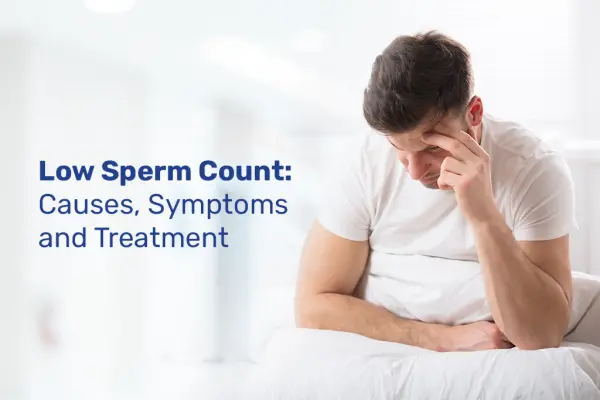Infertility in both men and women can have a variety of reasons. More than one-third of infertility cases have a male factor caused by issues with low sperm delivery or low sperm production.
What Are the Causes of Low Sperm Count?
There are numerous reasons for low sperm count or other sperm abnormalities. The reasons are as follows:
- Surgeries, infections, and current and previous health problems: Urinary tract infections, mumps, and sexually transmitted diseases like Chlamydia may leave scars that obstruct the sperm’s delicate passage from the testicles to the penis. Retrograde (reverse) ejaculation can result from spinal cord injury, diabetes, specific procedures, and sperm flow blockages.
- Genetic or disease-related conditions: Various chronic illnesses and medications used to treat them can cause low sperm count. Men with low sperm counts may do so due to illnesses such as testicular or prostate cancer, diabetes, high blood pressure, and peripheral vascular disease.
- Lifestyle: Smoking, vaping, heavy drug and alcohol use, as well as other similar behaviours, may reduce the amount of sperm. Testicles almost invariably shrink, and sperm production declines when anabolic steroids are typically used to improve muscular mass. Additionally, the consumption of marijuana and medications also lower sperm counts.
- Heat: A certain temperature, which is slightly lower than your body temperature, is optimal for the function of your testicles.
- Events involving heat that impact sperm production include: the testicles are not descended. The testicles are too hot if they are still up near the groin. With varicocele veins, the temperature of the testicles may arise due to these prominent, convoluted veins.
- Drugs and medications: Your sperm count may decrease due to prescription and illegal drugs. Numerous medicine categories may be involved. Some of these medicines consist of Testosterone, methadone, nitrofurantoin, lamotrigine, clomipramine, paroxetine, prednisone, methotrexate, finasteride, and Sirolimus.
- Immunologic Infertility: Men may occasionally produce antibodies that target their own sperm. Most typically, injuries, operations, or infections result in the production of antibodies. They prevent sperm from functioning normally and from migrating. Exactly how antibodies reduce fertility is still unknown. This is a rare reason for low sperm count.
- Stress: Stress has a negative impact on semen quality, but the exact mechanism is still unclear. Researchers have shown that stress may release steroid hormones such as glucocorticoids, which can lower testosterone levels and sperm production. Another option is oxidative stress, which has been shown to harm the quality of sperm and semen as well as fertility.
What Are the Symptoms of Low Sperm Count?
- The inability to conceive a child is a main sign of a low sperm count. There may be no other visible symptoms or indicators. In some men, the underlying reason for low sperm count symptoms could be hereditary chromosomal abnormalities, hormone imbalance, dilated testicular veins, or a condition that decreases sperm mobility.
- Having discomfort, oedema, or a bump near the testicles.
- Reduced hair on the face or body
- Less facial or body hair, swelling or pain in the testicles
- Erectile dysfunction and less sex drive
What Is Low Sperm Count Treatment?
You may receive different low sperm count treatments based on your low sperm count reason. Additionally, there are a few methods you can alter your routine while trying to conceive (TTC) that could increase your odds of getting pregnant.
- Surgery: For instance, a varicocele can frequently be surgically fixed, and a blocked vas deferens can also be fixed. Vasectomy procedures from the past can be reversed. Sperm can be taken straight from the testicles or epididymis using sperm retrieval techniques.
- Removing infections from the body: While antibiotics can treat a reproductive tract infection, fertility isn’t always restored.
- Injection of Intracytoplasmic Sperm (ICSI): In an IVF procedure known as intracytoplasmic sperm injection (ICSI). In this procedure, one sperm is injected into an egg’s cytoplasm to fertilise it. After that, the fertilised egg is placed in the woman’s womb.
- Gonadotrophin hormone therapy: You should be provided gonadotrophin medication as a therapy option if you have extremely low levels of the hormones gonadotrophin, which promote the production of sperm. However, you won’t be given hormone-based medications if there is no known reason for your abnormal sperm count because they are not known to increase fertility in such situations.
- Lifestyle and natural remedies: You can take actions at home to improve your chances of becoming pregnant with your partner, such as increased sex events. The likelihood of getting your partner pregnant increases if you engage in sexual activity regularly, starting at least four days before ovulation.
- Eliminate lubricants: Saliva, lotions, Astroglide, and K-Y jelly are some items that could affect sperm activity and migration. For lubricants that won’t harm sperm, consult your doctor.
- Alternative medical treatment: black seed (Nigella sativa), coenzyme Q10, folic acid, horse chestnut (aescin), L-carnitine, Panax ginseng, and zinc are among the supplements with research suggesting they may improve sperm count or quality. Before beginning this therapy, discuss the risks and advantages with your doctor, as some dietary supplements, especially those taken in high amounts (megadoses) or for long periods, may be dangerous.
Conclusion
In cases like low sperm count, erectile dysfunction, or early ejaculation, medication or counselling can boost fertility. Immediately consulting your doctor for diagnosis and treatment is the best step.

